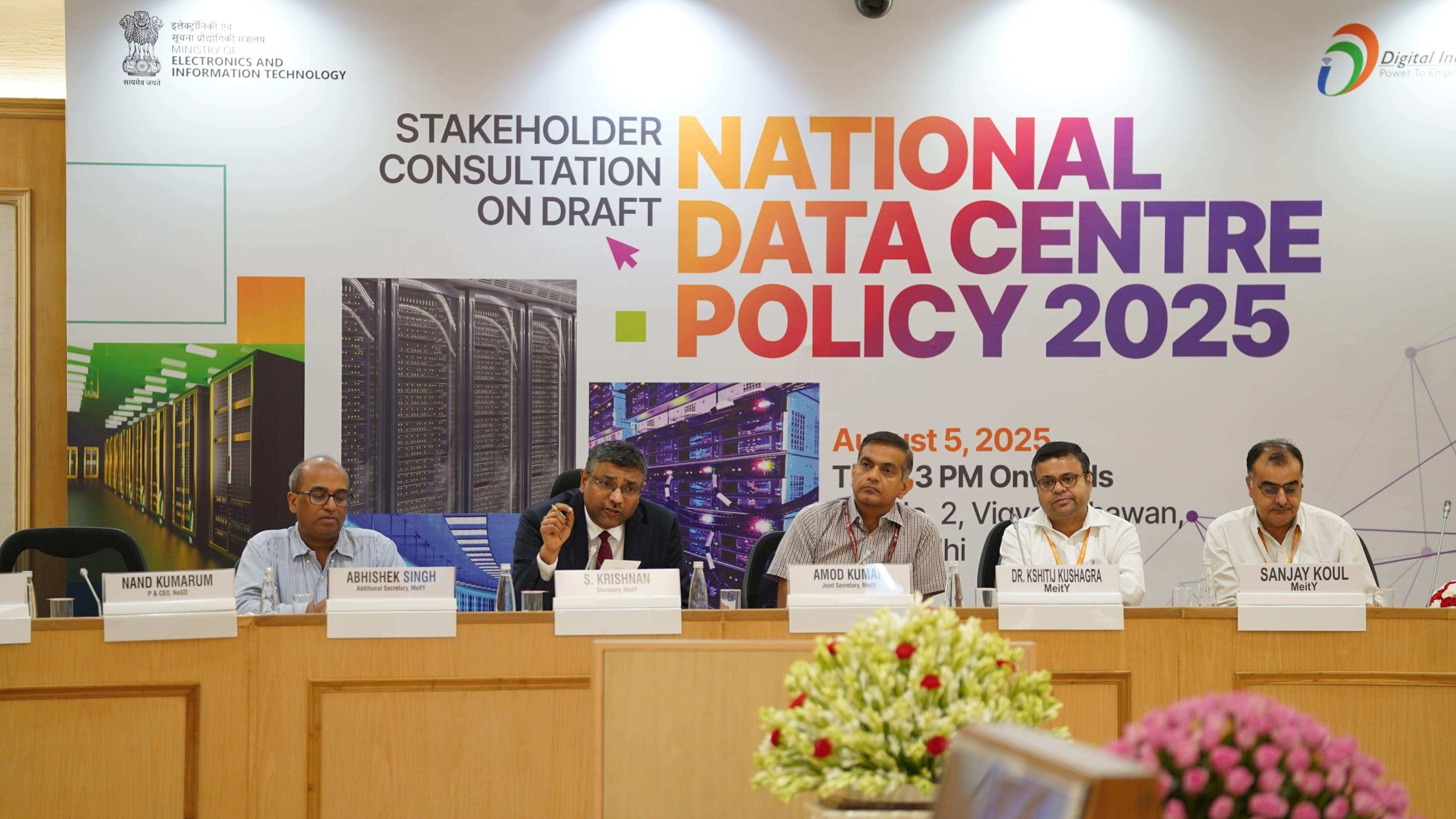India has proposed a 20-year conditional tax holiday for data centers, amidst a slew of other benefits for data center operators, that could prove to be a potential game changer for the industry. But what exactly would this entail? To find out more, w.media spoke to some of the biggest names in India’s digital infrastructure industry, and here’s what they had to say.
India’s digital transformation journey
Since its Information Technology (IT) revolution, that began in the early 90’s, India has been on a journey of digital transformation, albeit at its own pace, catering to the unique demands of its diverse people and industries. While conversations about data centers are more popular today, the truth is that the digital infrastructure industry has been growing and evolving over nearly three decades in India.
With increased adoption of online services for banking, education, e-commerce, and e-governance, along with the growing popularity of social media, and ubiquity of electronic payments, data centers have become the lifeblood of the Indian economy.
States like Maharashtra, Telangana, and Tamil Nadu were some of the first to consider developing their own state-specific comprehensive data center policies, ultimately paving the way for a National Data Center Policy. The buzz for a national policy grew louder during the COVID19 pandemic, when even people who had never considered engaging much with online services, were forced to fully embrace the digital life, thus discovering its many conveniences. Even after the pandemic ended, the economy, and more importantly the people, did not want to go back to the old ways, and embraced the digital life with renewed vigour.
Need for a robust national policy
India’s data center capacity surged past the 1 GW mark at the end of 2024, and stood at around 1030 MW (live IT load) of which 993 MW was occupied, as per a JLL report titled India Data Center Market Dynamics. The same report also says that India’s data center capacity could go up to 1.8 GW by the end of 2027. Similarly, a Colliers report titled The digital backbone: Data center growth prospects in India, finds that India’s data center market could see capacity across the top seven cities exceed 4,500MW or 4.5GW by 2030, which in turn is likely to translate into real estate footprint of around 55 million sq ft in the next 5-6 years. It further says that this is likely to attract investments to the tune of US$ 20-25 billion.
Over the last five years, as India’s data center industry has been attracting global attention and investments, it has also showcased a determination to embrace best practices pertaining to sustainability and skills development. This has in turn added more dimensions to the conversation surrounding the need to develop a truly robust National Data Center Policy. In early August, India’s Ministry of Electronic and Information Technology (MEITy) held a meeting of various stakeholders to discuss ways in which a national policy could truly aid in the next stage of tech-savvy nation’s digital transformation. The result was a draft document that was circulated among stakeholders.
Proposed incentives in the draft policy
The draft policy being circulated proposes a series of tax exemptions, as well as other sops to help the industry deal with new demands and pressures of an ever evolving digital technology landscape. The draft policy offers up to 20 years of tax exemptions for data center operators, subject to meeting certain targets of capacity addition, power usage effectiveness, and job creation. It proposes an Input Tax Credit (ITC) on Goods and Services Tax (GST) levied on capital assets such as construction materials as well as heating, ventilation, air conditioning (HVAC) systems and electrical equipment.
Reportedly, foreign companies leasing over 100 MW could also be considered eligible for being granted a permanent establishment status. States are also being encouraged to earmark land near IT corridors, industrial zones, and manufacturing clusters, offering ready-to-deploy locations for hyperscale data centres.
Industry captains respond
Most data center business leaders are viewing this policy in a favourable light, and are cautiously optimistic about its provisions and proposals.
 “The draft National Data Center Policy has the potential to set India on the path to be the most attractive destination for Data Centers,” says Sharad Agarwal, CEO, Sify Infinit Spaces. “Couple of industry asks have been around a single window authority, clarity around renewable power policies, building codes and auto approvals. Importantly, the aim should be to build cohesiveness among all approving authorities and hence, help players cut time-to-market drastically.”
“The draft National Data Center Policy has the potential to set India on the path to be the most attractive destination for Data Centers,” says Sharad Agarwal, CEO, Sify Infinit Spaces. “Couple of industry asks have been around a single window authority, clarity around renewable power policies, building codes and auto approvals. Importantly, the aim should be to build cohesiveness among all approving authorities and hence, help players cut time-to-market drastically.”

Taking to LinkedIn, Surajit Chatterjee, Managing Director & Head, Data Centres – India, CapitaLand Investment, said, “The Government’s draft National Data Centre Policy 2025 caught my attention. While still under consultation and awaiting approval, the proposed framework signals serious intent.” However he cautioned that the policy’s success “will depend on securing Ministry of Finance approval and streamlined execution.” Ending on an upbeat note, he said, “If enacted, this framework could position India alongside Singapore and UAE as a preferred data centre destination. The performance-based approach ensures public investment translates to measurable outcomes.”

According to Kalyan Muppaneni, Founder & CEO, Pi Datacenters, “What India needs, especially to become self-sufficient is, a uniform Open Access green energy policy of datacenter consumption across all states.” Furthermore, when it comes to sops, there needs to be an “accountable incentives policy by the government that is time bound for disbursements.” He also bats for data centers in non-metros, especially those that are being built by homegrown companies. “Additional incentives or tax breaks for building datacenters in Tier 2 and 3 cities,” and “low-interest rate funding for capital investments for native Indian datacenter companies, to compete with other countries to build infrastructure,” are two things, in his opinion, that could help the industry grow.

“The draft National Data Centre Policy 2025 is a timely and strategic move to solidify India’s position as a global data infrastructure hub. Its focus on tax incentives, single-window clearances, and green energy aligns well with emerging digital and sustainability imperatives,” says Anil Nama, CIO, CtrlS Datacenters. However, he points out, “To fully realize its potential, the policy must be backed by regulatory uniformity across states, expedited approvals, pre-allocated land banks, and assured access to clean power. Clearer financing mechanisms and consistent state-level adoption will be critical to de-risking investments. With effective execution, the policy can catalyze exponential growth in hyperscale, AI, and cloud infrastructure—positioning India as a competitive and sustainable digital economy.”

“The Draft National Data Center Policy signals a bold step forward in recognizing India’s potential as a global data hub. I welcome its far-reaching incentives and reforms from 20-year tax exemptions to harmonized regulations which are set to strengthen our nation’s digital backbone,” says Amit Agrawal, President, Techno Digital. “Yet, as someone deeply invested in building out India’s digital infrastructure, I believe we must go further on practical implementation: streamlining approvals, reforming power procurement especially for new markets, and simplifying compliance. A strong policy sets the pace, but what will truly make India a preferred destination is ensuring every data center developer feels empowered and supported from metro to emerging cities.”
Conclusion
In wake of the Artificial Intelligence (AI) boom that sparked what is being hailed as the Fourth Industrial Revolution, and increased automation, our data centers need to become “future-ready”. This is a complex term encompassing their ability to deal with AI workloads, scale up, and yet remain sustainable. The national policy, thus, faces a tightrope walk where it needs to take all this into account, and deliver a balanced and comprehensive solution aimed at alleviating some of the most pressing concerns of the industry.


